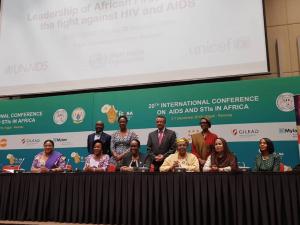African First Ladies laud progress against HIV, urge more efforts
Kigali, 2 December 2019 – Six African First Ladies today renewed their commitment to ending childhood AIDS in Africa by 2030 and keeping their mothers healthy. This came during a high-level meeting organized by the Organisation of African First Ladies for Development (OAFLAD) on the sidelines of the International Conference on AIDS and Sexually Transmitted Infections in Africa (ICASA) in Kigali, Rwanda.
The event was an opportunity to reflect on the unique national, regional and global leadership role that African First Ladies play in the fight against HIV.
The First Lady of Rwanda, HE Madam Jeannette Kagame welcomed the participants to Kigali and spoke about the 17-year journey OAFLAD has made since it was established. She said “Celebrating our gains should also lead us to a deeper analysis of our journey thus far.”
The First Lady of Congo and OAFLAD President, HE Madam Antoinette Sassou N’guesso opened the meeting by saying, “Under our leadership we have seen successes in the fight against HIV and AIDS … I would like to assure our partners and the population that the First Ladies …. will continue to lend their strong support to the fight against HIV and AIDS.”
The high-level meeting celebrated successes in the HIV response and the transformative leadership of the First Ladies, but also highlighted challenges such as the slowing momentum in cutting new HIV infections and the large funding shortfalls.
The speakers included the First Lady of Botswana, HE Madam Neo Jane Masisi, First Lady of Chad, HE Madam Hinda Deby Itno, First Lady of Ghana, HE Madam Rebecca Akufo-Addo, First Lady of Niger, HE Madam Aissata Issoufou Mahamadou, WHO Director-General Dr Tedros Adhanom Ghebreyesus and UNAIDS Executive Director Winnie Byayima.
They stressed that social determinants of health such as gender violence, child marriage, gender inequality, poverty continue to contribute to HIV among adolescent girls and women.
Two years ago, OAFLAD and the African Union launched the “Free to Shine” campaign which reinforced the political commitment of African nations to end childhood AIDS and keep mothers healthy. OAFLAD and WHO signed an agreement in February 2016 to work together to end AIDS, enable political commitments to eliminate cervical cancer and stop maternal, newborn, child and adolescent deaths in the African region by 2030.
“Since its establishment in 2002, the Organization has been a trailblazer in Africa in raising awareness on the HIV/AIDS pandemic, mobilizing resources, promoting strong community leadership and networks to advocate for people living with HIV,” said Dr Tedros. He also congratulated the First Ladies on their new strategic plan which emphasizes Universal Health Coverage and a healthier population in Africa.
The new OAFLAD strategic plan for 2019–2023 aims to contribute to the health and well-being of children, youth and women through advocacy, resource mobilization and strategic partnerships.
On the continent, Eastern and Southern Africa are leading the elimination of mother-to-child transmission of HIV, with an average of 92% of pregnant women receiving anti-retroviral therapy. Botswana, Malawi, Namibia and Rwanda are among an ever-increasing number of countries making great progress in the prevention of mother-to-child transmission with a more than 70% decrease in children 0–14 years acquiring HIV from 2010 to 2018.
Senior Editor/Writer
Email: ottob [at] who.int (ottob[at]who[dot]int)
Communications and marketing officer
Tel: + 242 06 520 65 65 (WhatsApp)
Email: boakyeagyemangc [at] who.int (boakyeagyemangc[at]who[dot]int)




